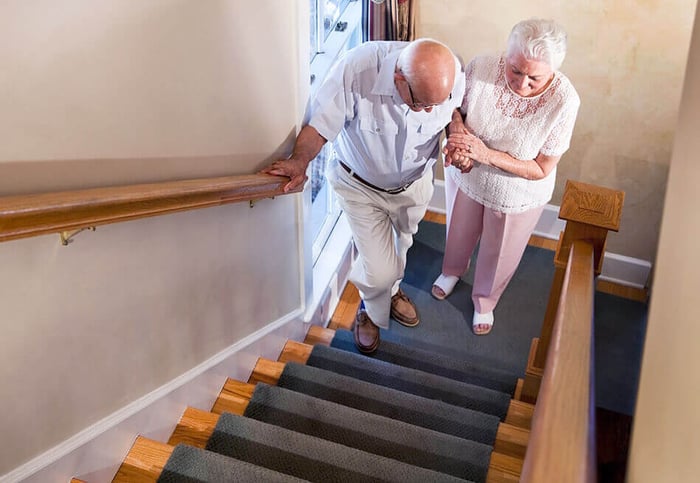As caregivers, we understand the crucial role a mobility aid plays in enhancing the quality of life for a loved one with mobility challenges. Whether due to age, injury or a medical condition, finding the right mobility aid is essential to promote independence and ensure safety. With a wide range of options available in the market today, choosing the most suitable mobility aid can be a daunting task.
When considering mobility aids, it's important to assess the individual's specific requirements and capabilities. From canes and walkers to wheelchairs and scooters, each option offers distinct benefits. Let's take a look at what you should know about the various mobility aid options and all the factors you should consider so that you make the right choice.
Understanding Mobility Aids and Their Importance
Mobility aids are devices that are designed to assist individuals with mobility impairments to move around and perform daily activities with greater ease and independence. These impairments can arise from a wide range of conditions, including aging, neurological disorders, spinal cord injuries, and other disabilities. The use of mobility aids has become increasingly important as the global population ages, and the prevalence of mobility impairments continues to rise.
According to the World Health Organization (WHO), around 15% of the global population lives with some form of disability, and this number is expected to increase as the population ages. The WHO estimates, in a recent report, that by 2050, the global population of individuals aged 60 years and above will reach 2 billion, up from 900 million in 2015. This increase in the number of older adults is likely to result in a corresponding rise in the prevalence of mobility impairments, making mobility aids an essential tool for maintaining independence and quality of life.
Fortunately, advancements in technology have led to the development of many different types of mobility aids that can cater to a wide range of needs and preferences. From manual wheelchairs to motorized scooters and high-tech power wheelchairs, there are options available for individuals with varying degrees of mobility impairment. Additionally, the rise of the internet and e-commerce has made it easier than ever to research and purchase mobility aids online, making these devices more accessible to people all over the world.
Mobility aids not only help individuals with mobility impairments to maintain their independence but can also have a positive impact on their overall health and well-being. Being able to move around freely can help to reduce the risk of social isolation, depression, and other negative health outcomes. Additionally, using a mobility aid can help to conserve energy
Types of Mobility Aids: Wheelchairs, Scooters, and More
As we have already mentioned, for people who are no longer entirely independent or comfortable when moving around, there are many options for assistive devices. The most common types of mobility aids include manual wheelchairs, power wheelchairs, electric scooters, walkers, and canes.
Manual wheelchairs are the most basic type of mobility aid and are propelled by the user or a caregiver pushing the chair's large rear wheels. They are typically lightweight and highly maneuverable, making them a popular choice for individuals who need to navigate tight spaces and uneven terrain.
Power wheelchairs are similar to manual wheelchairs but are powered by an electric motor. They are controlled using a joystick or other input device and can be configured for indoor or outdoor use. Power wheelchairs are often recommended for individuals who have limited upper body strength or mobility.
Electric scooters are a popular option for individuals who have limited mobility but want to maintain their independence when traveling short distances. These scooters are compact and easy to maneuver, making them a good choice for navigating busy sidewalks and narrow aisles in stores.
Walkers and canes are mobility aids that are designed to provide additional support and stability when walking. Walkers typically have four legs and a frame that the user holds on to, while canes are single-legged and used for balance and stability. These mobility aids are often recommended for individuals who have mild to moderate mobility impairments.
Factors to Consider When Choosing a Mobility Aid
When choosing a mobility aid, there are several factors that individuals should consider to ensure that they select the device that best meets their needs. These factors include:
- The person's level of mobility or the nature of their impairment is perhaps the key factor. For example, people who have limited upper body strength may benefit more from a power wheelchair, while those with only mild mobility impairment or balance problems may find a cane or walker sufficient.
- It’s also important to consider the individual's lifestyle when choosing a mobility aid. For example, someone who enjoys spending time outdoors may benefit from an electric scooter, while someone who needs to navigate narrow hallways or doorways may prefer a manual wheelchair.
- Mobility aids come in a variety of sizes and weights, so it is advisable to choose a device that is both comfortable and practical for the user. Individuals who plan to transport their mobility aid frequently may want to choose a lightweight option that can be easily folded and stored.
- Mobility aids vary widely in price, While the initial cost is an important factor, it’s also wise to consider the potential cost of upgrading at a later stage if the impairment gets worse. It’s worth noting that some insurance plans may cover the cost of mobility aids, so individuals should check their coverage before making a purchase.
- Finally, buyers should remember to consider the maintenance and repair requirements of their preferred mobility aid before making a final decision. More elaborate devices will probably require more frequent maintenance than others. It also helps to choose a device that can be easily repaired, when necessary, to keep downtime to a minimum and avoid possible incidental cost.
In closing, whilst mobility aids have been a game-changer for people with reduced mobility, it can be quite daunting to choose the ideal product. Modern mobility aids allow people to maintain their independence and their overall quality of life but, with so many different options available, it’s quite important understand all the factors and to prioritize them clearly. Consider a mobility aid an investment in your independence and lifestyle. You need not and should not make this decision on your own. At LL Medico, we have a range of mobility products to suit every pocket and every lifestyle choice. And, with more than 25 years of experience in senior care products, we have the all expertise you will ever need.
Whether you need mobility aids, incontinence products or nutritional supplements, the team at LL Medico will be happy to assist. Give us a call at (855) 422-4556 or email us at support@llmedico.com. Between 9am and 5pm EST, we’re also available for an online chat.







 855-422-4556
855-422-4556 Chat
Chat E-Mail
E-Mail Monday - Friday 9:00AM to 5:00PM EST
Monday - Friday 9:00AM to 5:00PM EST





 Shopping With LL Medico
Shopping With LL Medico
 855-422-4556
855-422-4556